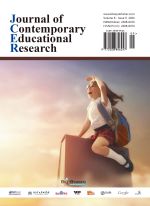Abstract
The Veterinary Microbiology course is centered around the diagnosis and testing of pathogenic microorganisms, with the core value of “moral education and character development.” It reconstructs multidimensional teaching resources by integrating disciplinary achievements with clinical cases and implements a hybrid teaching approach combining virtual simulation and problem-based learning (PBL) through the “three stages + four models + three reflections” framework. Dual-qualification teachers employ various teaching methods, create a “six-in-one” model for ideological and political education, and conduct formative assessments based on the principles of diversified objectives and process emphasis. The hybrid teaching reform addresses issues such as fragmented knowledge, insufficient class hours, weak animal disease diagnostic abilities among students, limited application and expansion of knowledge points, and students’ lack of proactive critical thinking skills. The application of hybrid teaching has shown significant advantages and effectiveness, providing a reference for teaching reform in similar microbiology courses.
References
Sun Y, Liu R, 2022, Summary of Hybrid Teaching Research in Domestic Universities. Journal of Chongqing Jiaotong University (Social Science Edition), 22(4): 96–103.
He K, 2004, Looking at the New Development of Educational Technology Theory from Blending Learning (Part A). Research on Audio-Visual Education, 2004(03): 1–6.
He K, 2004, Looking at the New Development of Educational Technology Theory from Blending Learning (Part B). Research on Audio-Visual Education, 2004(04): 22–26.
Wang S, 2017, Rain Classroom: A Smart Teaching Tool under the Background of Mobile Internet and Big Data. Modern Educational Technology, 27(05): 26–32.
Yang X, Zheng X, Tian C, 2021, Connotation, Construction Objectives and Construction Strategies of Online and Offline Hybrid First-Class Undergraduate Courses. Modern Educational Technology, 31(09): 104–111.
Chen J, 2022, On the Innovative Talent Training Model based on Hybrid Teaching. Education Journal of Renmin University of China, 2022(1): 87–98.
Qiu Y, Li Z, 2020, From “Online Teaching Competency” to “Double-Line Hybrid Teaching Competency.” Distance Education in China, 41(07): 7–15.
Wei Z, Luo Z, Du J, 2020, A Hybrid Teaching Research with the Goal of Improving Students’ Learning Initiative. Educational Theory and Practice, 40(33): 59–61.
Chen F, He J, Duanmu D, et al., 2020, Practice and Exploration of Small-Scale Restricted Online Course (SPOC) Model in Microbiology Teaching. Microbiology Notification, 47(04): 1087–1094.
Sun C, Zhou H, Dong B, 2024, Application of “PBL” Teaching Mode in the Experimental Teaching of Inorganic Chemistry in the Ideological and Political Perspective—Take the Preparation of Manganese Carbonate as an Example. University Chemistry, OnlineFirst.
Dong Y, Sun W, 2019, To Promote the Productive Learning (DoPBL) Model of Interdisciplinary Learning—Based on the Integration of Problem PBL and Item PBL. Journal of Distance Education, 37(02): 81–89.
Dong Y, Jing Y, 2019, Inquiry on the Application of PBL Project-Based Learning in University Teaching. Modern Educational Technology, 29(9): 53–58.
Xing X, Li J, 2021, New Ideas for the Development of Online Education in the “Internet+” Era. Audio-Visual Education in China, 2021(05): 57–62.
Yang X, Zheng X, Liang L, 2020, Research on the Value Implication and Practical Path of Ideological and Political College Courses under the Background of “Internet+.” Research on Audio-Visual Education, 41(12): 71–78.
Zhang S, Gao L, Yang Y, 2023, The Teaching Dilemma and Improvement Strategies of Ideological and Political Mixture in College Courses. Educational Theory and Practice, 43(3): 57–60.
Xiong H, 2020, Virtual Simulation Experimental Teaching Promotes the Integration Reform and Innovation of Theoretical Teaching and Experimental Teaching. Experimental Technology and Management, 37(5): 1–4, 16.
Li Y, Zhang J, Rao X, et al., 2023, Construction and Practice of Virtual Simulation Experiment Teaching Platform in Universities based on Digitization. Laboratory Research and Exploration, 42(10): 233–238.
Liu J, Ge Y, Huang J, et al., 2023, Virtual Simulation Experiment Teaching Course: A New Model of Digital Enabling Engineering Ability Training. Research on Higher Engineering Education, 2023(03): 85–88.
Lu X, Zhu T, Xu J, et al., 2021, Basic Problems and Trends of Virtual Simulation Experiment Teaching in Colleges and Universities. Modern Educational Technology, 31(12): 61–68.
Cheng L, 2023, The Connotation, Characteristics, Basic Principles and Policy Elements of the Digital Transformation of Education. Research on Audio-Visual Education, 44(04): 53–56.
Chen W, Xu X, Qiu D, 2023, Construction and Practice of Multi-Course Evaluation System of Pathogen Biology and Immunology under Blended Teaching Mode. Chinese Journal of Immunology, OnlineFirst.
